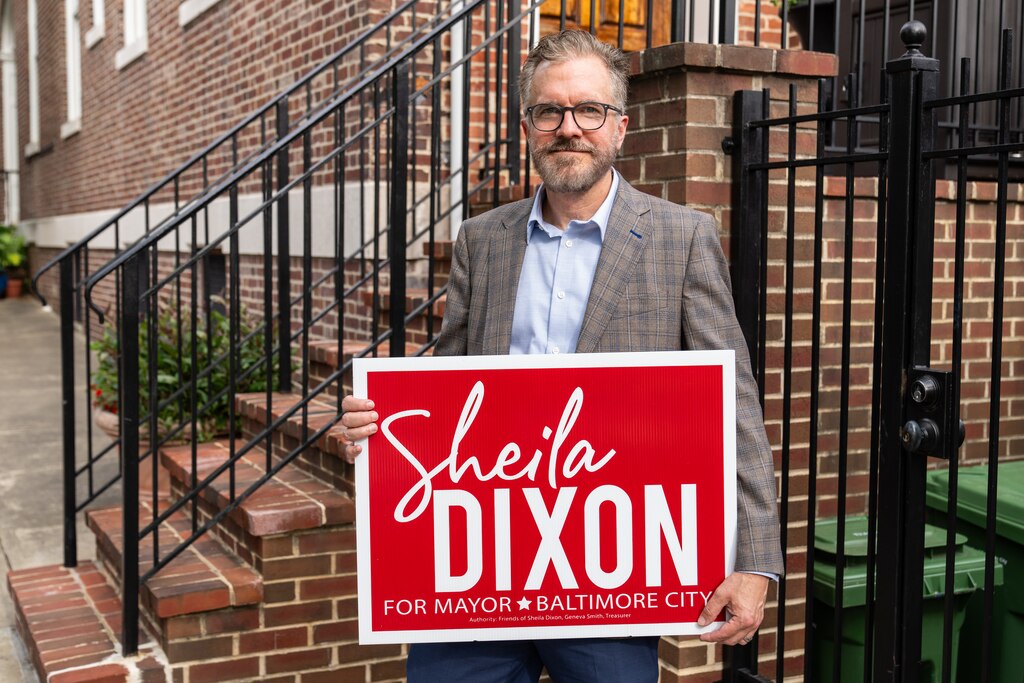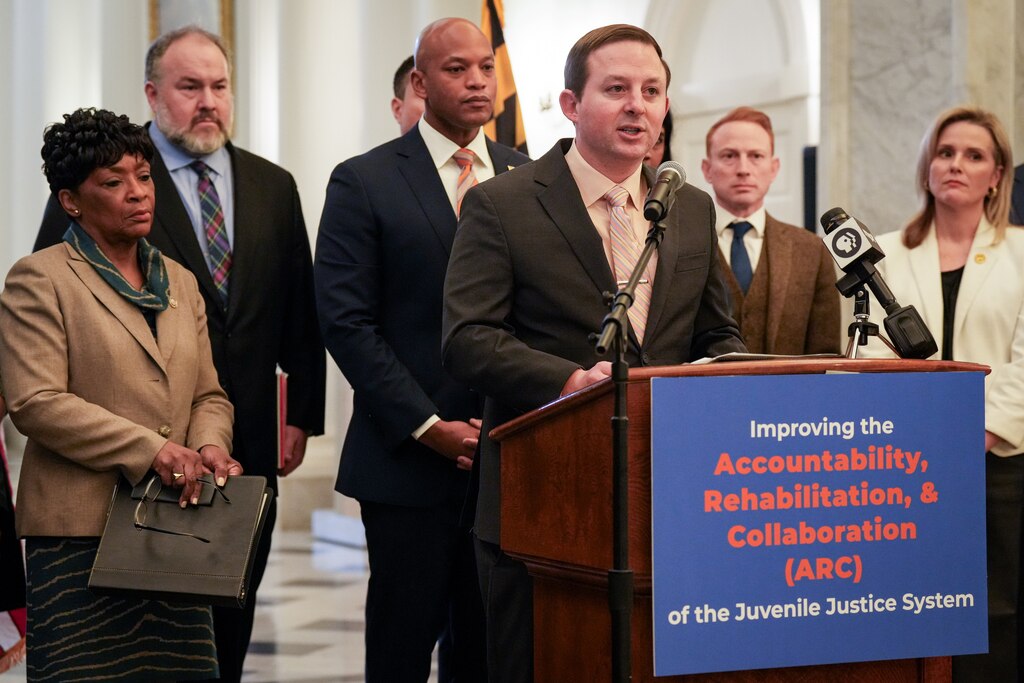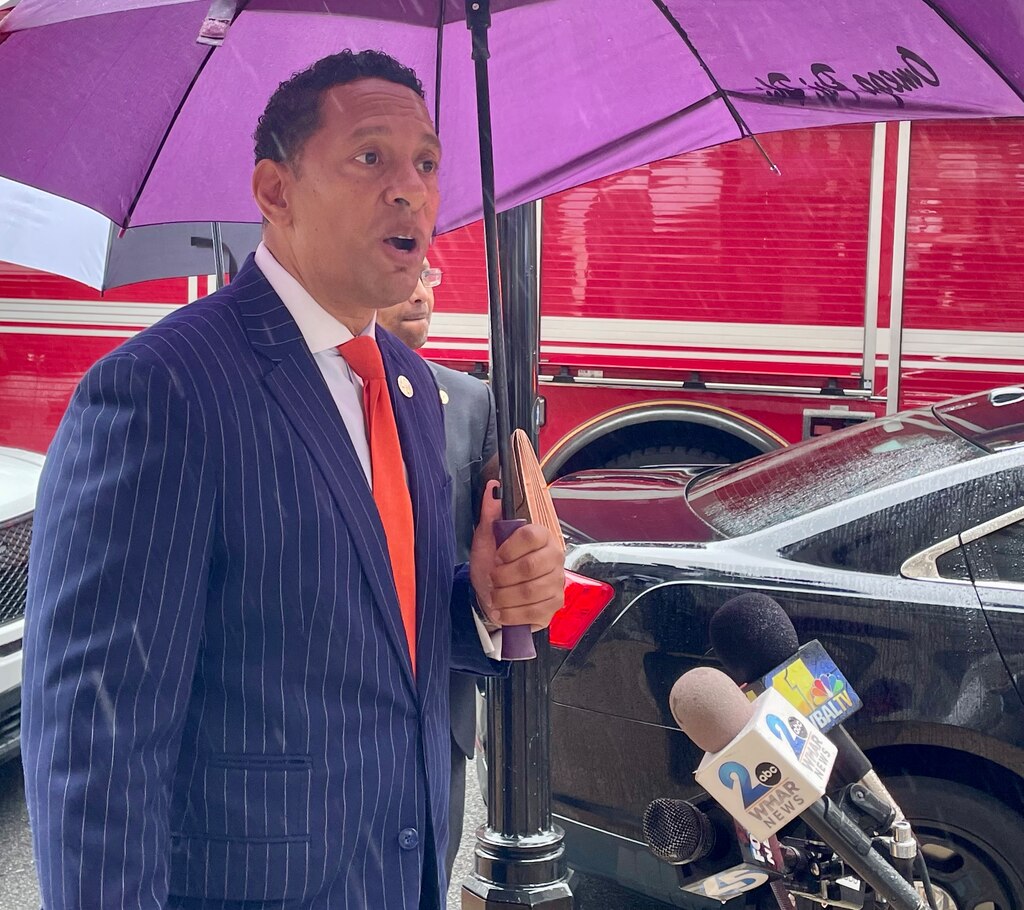The 66-year-old man is already face down, motionless, when the surveillance video clip starts. One of the assailants jumps and stomps on his head. Another punches him in the back, and a third rifles through the man’s pants pockets before they all take off.
As it rocketed across Baltimore social media accounts, the 30-second video first sparked anger, and then outrage, when people heard that the Maryland Department of Juvenile Services had released the youngest of two people arrested in connection with the South Madeira Street attack to a guardian.
The state’s attorney has charged an 18-year-old and a 15-year-old in the Sept. 26 incident with attempted first-degree murder and related offenses. The younger teen has been charged as an adult. The victim is white. The two people charged are Black.
Since the attack, officials have learned more. The man alleges that five people were present. Only three were seen in the video. And the officials who had to make charging decisions immediately after the incident — Baltimore Police and the juvenile services agency — hadn’t seen the video until after they’d made them.
Though youth arrests and overall violent crime are down in Baltimore, no statistic or downward trend seems to quell people’s fear and provide perspective. Other crimes from that week, including a shooting of a young adult, received far less attention.
The incident in a relatively safe neighborhood has triggered the latest discussion of the state’s youth legal system, a seemingly perpetual cycle of frustration and finger pointing. Neighbors, politicians and those who work in the youth legal system have thoughts about what went wrong, who deserves punishment and how harsh it should be. Here are some of those conversations.
‘We can’t throw public safety out the window’

Arch McKown is invested in his community. He wants to keep it, and his own family, safe. But he doesn’t believe the juvenile services agency’s policies align with public safety.
McKown thinks the agency made a mistake by releasing the 15-year-old to a guardian, and he’s frustrated with the lack of answers about why that happened.
“In these cases they need to pump the brakes particularly in cases of violent crime,” McKown said.
That’s why he’s writing to Gov. Wes Moore and signed a petition to ask for the resignation of the juvenile services secretary, whom he calls an “ideologue” because of his reform-minded approach to youth justice.
Though he doesn’t know much about Secretary Vincent Schiraldi’s career other than what he’s seen in news stories critical of his leadership, he said an agency head “sets the tone; if there’s dysfunction, they have to start at the top.”
McKown years ago set up a community surveillance network through Butchers Hill and Patterson Park. Neighbors that have doorbell cameras volunteer to participate. He’ll reach out to the police if someone spots trouble. And he sits on a council that works with police.
That’s why he got a phone call before 7 a.m. the day after the attack from the victim’s daughter asking for help. “I think they were just stunned,” McKown said.
He said he doesn’t want more kids to be locked up, “but we can’t throw public safety out the window.”
He asked, “What’s the harm of holding a kid there [in detention] for a matter of hours. Like, say, 12 hours?”
Accountability equals public safety

“This is a really upsetting video, and there’s no way around that,” said Heather Warnken, executive director of the Center for Criminal Justice Reform at the University of Baltimore School of Law. “And it makes a lot of sense that people would be afraid, and that people would want an appropriately serious response to a very serious event.”
But people mistakenly conflate accountability with harsh punishment, she said. Charging children as adults, and even detaining them in the youth system before trial, she said, leads to less public safety, poorer outcomes for youth and drives recidivism.
”Being serious about public safety means being serious about what works to keep the community safe,” Warnken said.
True accountability is one piece of what keeps people safe, alongside investment in communities, she said, and “there are very rigorous and specific ways to hold people accountable, including young people that commit very serious acts of violence, in more age appropriate and effective ways than throwing them into the adult system.”
Some of these can include restorative practices that help the child to take responsibility for their actions, show remorse, make amends and stop the behavior, she said.
Administration changes policy

Schiraldi, the juvenile services secretary, is not a politician. Though he is one of the country’s leading experts on how using evidence-based practices in a criminal legal system can make communities safer. And the governor knew that when he hired him.
Ahead of his election, Moore, a Democrat, made clear he wanted to revamp a youth legal system that disproportionately jails Black young men as part of a larger plan to reduce violent crime in Baltimore — one of the reasons Moore said he ran for office.
Moore has made it Schiraldi’s job to focus on youth rehabilitation, and this includes holding young people accountable.
Days after the attack and release of the 15-year-old, Schiraldi announced children charged with a violent crime but released to a guardian would go home with an electronic monitoring device, a decision that Baltimore’s mayor and state’s attorney praised.
”The Maryland Department of Juvenile Services is focused on promoting accountability, rehabilitation, and preventing justice-involved young people from reoffending,” Schiraldi said as part of the announcement.
State privacy laws bar the agency from discussing individual children and their cases but the department condemned violence “in all forms.”
In a speech last year, Moore said there was “nothing more important” to him as governor than public safety and addressing it meant combatting false narratives about crime and the communities that experience it most. And he called on politicians to “depoliticize” the rhetoric about crime and to stop leveraging community violence to earn political support.
“We need to work together,” he said. “And until we stop this political blame game while people die, we are never going to make progress.”
‘A wrong situation did change’

After seeing the video, one of Maryland Senate President Bill Ferguson’s first phone calls was to Schiraldi, he told WBAL NewsRadio.
Ferguson, a Democrat from Baltimore, and other state lawmakers issued a statement on social media the next day, letting constituents know they were seeking answers from the cabinet secretary as to why the 15-year-old was released.
City officials released statements expressing frustration with the juvenile services agency. Mayor Brandon Scott said police had done their jobs, but “clearly the larger system continues to fail these young people by returning them to the same environment.” Police Commissioner Richard Worley said more must be done to address youth crime “and the lack of consequences and accountability.”
Within 12 hours, Ferguson said that, to him, “It was clear that something had gone wrong.”
Police, he said, initially charged the 15-year-old with robbery, an offense that, on its own, may not have required juvenile services to detain the child. And when intake staff made that call, Ferguson said, the video of the attack had not been made public.
After Schiraldi saw the video, Ferguson recalled the cabinet secretary saying to him, “‘That doesn’t seem right, let me look into it.’” And after seeing the video, the state’s attorney altered the charges and issued new warrants, Ferguson said.
“What was clearly a wrong situation did change,” he said.
The video ‘speaks for itself’

Rumors swirled in the days after the attack that Baltimore State’s Attorney Ivan Bates planned to charge the 15-year-old as an adult.
Bates, a Democrat, had stood in front of TV cameras and microphones outside the Elijah E. Cummings Courthouse, fresh from a guilty plea in a separate high-profile case.
Reporters asked the state’s attorney what charges he would file against the 15-year-old. Bates teased that details would come soon.
”I think the video that some people have seen kind of speaks for itself,” Bates said. ”If you’re going to stomp on individuals’ heads, then you can expect to be charged with attempted murder.”
But when a reporter asked, Bates declined to clarify which one of the assailants stomped on the victim’s head.
Hours later, his office announced that it had obtained an indictment against the 15-year-old on charges of attempted first-degree murder and related offenses.
“While we did not make this decision lightly, the gravity of the alleged crime and the threat to public safety require us to act,” Bates said in a statement.
‘Improperly overcharged’
The 15-year-old lives about 5 miles west of the crime scene, in a neighborhood where drugs are bought and sold just yards from preschool-aged children playing and laughing. His ZIP code had the third-highest rate of imprisonment in the state in 2020, according to the Prison Policy Initiative.
Attempts to reach the teen’s family were unsuccessful. But his attorney said in a statement that the teen has not been accused of stomping or hitting the victim or carrying a gun, and he has never been convicted of a crime in adult or juvenile court.
Bates has “improperly overcharged” his client as an adult, Assistant Public Defender Brian Levy said.
“The State’s Attorney has furthermore allowed the facts to be distorted here,” Levy said. “And unilaterally decided that a child be prosecuted as an adult, facing life in prison based on actions taken by older people.”
The state’s youth legal system has a history of arresting, charging and locking up overwhelmingly more Black children than their white counterparts and convicting far more Black children as adults.
Police have also arrested and charged Montaz Bailey, 18, of Upton, who is being held without bail. His attorney, Natalie Finegar, said she was unable to comment.
Victim ‘extremely shaken’
One week after the attack, the 66-year-old man who was attacked declined to speak with a reporter who came to his door.
He didn’t want to tell his story right then. He said it just wasn’t a good time.
But court records tell some of his story. Officers arrived on the scene just after 10 p.m. to find a man “extremely shaken and bleeding from the left side of his face.” The man told police he had been “assaulted and robbed by several Black males all wearing dark clothing and ski masks.”
He had parked his car and was walking to his home when he realized a group of people were following him. He said he had been hit from behind and when he turned one attacker pointed a handgun in his face.
The man told a reporter the day after the attack that at one point during the scuffle he asked his attackers what they wanted.
“He said, ‘I want everything,’” the man recalled one person saying.
He grabbed the barrel of the gun with both hands and a physical altercation ensued, knocking him to the ground. He was kicked and punched and at one point fell unconscious, he told police.
The video showed thousands of people what happened after.
Correction: This story was updated to correct that Arch McKown is writing a letter to the governor asking for the resignation of the juvenile services secretary.


Comments
Welcome to The Banner's subscriber-only commenting community. Please review our community guidelines.